字符串哈希算法
c++字符串哈希计算

在C++中,计算字符串的哈希值通常涉及到使用某种哈希函数。
哈希函数将输入(在这种情况下是字符串)转换为固定大小的输出,通常是整数。
这个输出被称为哈希值或哈希码。
在C++标准库中,没有内置的字符串哈希函数,但你可以使用第三方库,如Boost,或者自己实现一个简单的哈希函数。
另外,C++11引入了std::hash模板类,它可以用于获取标准类型的哈希值,包括std::string。
下面是一个使用std::hash来计算字符串哈希值的例子:cpp#include <iostream>#include <string>#include <functional>int main() {std::string str = "Hello, World!";std::hash<std::string> hasher;size_t hash = hasher(str);std::cout << "Hash value of \"" << str << "\" is: " << hash << std::endl; return 0;}在这个例子中,我们使用了std::hash<std::string>来创建一个字符串哈希函数对象。
然后,我们通过调用这个函数对象并传入我们的字符串来计算哈希值。
最后,我们打印出计算得到的哈希值。
请注意,不同的编译器和平台可能会产生不同的哈希值,因为C++标准并没有规定std::hash 的具体实现。
因此,如果你需要跨平台的一致性,你可能需要使用一个特定的哈希算法,如MD5、SHA-1或SHA-256,这些都可以通过第三方库(如OpenSSL或Crypto++)来实现。
然而,这些算法通常用于密码学和数据完整性检查,而不是普通的哈希表查找。
计算哈希值的方法
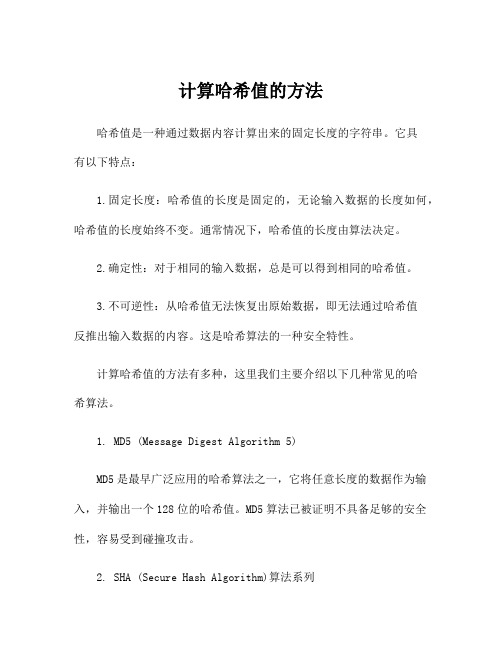
计算哈希值的方法哈希值是一种通过数据内容计算出来的固定长度的字符串。
它具有以下特点:1.固定长度:哈希值的长度是固定的,无论输入数据的长度如何,哈希值的长度始终不变。
通常情况下,哈希值的长度由算法决定。
2.确定性:对于相同的输入数据,总是可以得到相同的哈希值。
3.不可逆性:从哈希值无法恢复出原始数据,即无法通过哈希值反推出输入数据的内容。
这是哈希算法的一种安全特性。
计算哈希值的方法有多种,这里我们主要介绍以下几种常见的哈希算法。
1. MD5 (Message Digest Algorithm 5)MD5是最早广泛应用的哈希算法之一,它将任意长度的数据作为输入,并输出一个128位的哈希值。
MD5算法已被证明不具备足够的安全性,容易受到碰撞攻击。
2. SHA (Secure Hash Algorithm)算法系列SHA算法系列是继MD5之后被广泛采用的哈希算法。
SHA系列包括SHA-1、SHA-224、SHA-256、SHA-384和SHA-512等不同长度的哈希算法。
SHA-1已经不再被推荐使用,因为它的哈希值长度为160位,安全性相对较低,而且存在碰撞攻击的问题。
SHA-256是目前广泛使用的SHA算法,其哈希值长度为256位。
3. CRC32 (Cyclic Redundancy Check)CRC32是一种经典的哈希算法,广泛应用于数据校验中。
它将任意长度的数据作为输入,并输出一个32位的哈希值。
CRC32主要用于检测数据在传输过程中是否发生了错误。
4. HMAC (Hash-based Message Authentication Code)HMAC是一种基于哈希算法的消息验证码,常用于网络通信中的数据完整性校验和身份认证。
HMAC通过在哈希过程中引入额外的密钥,增加了安全性。
5. BcryptBcrypt是一种用于密码存储的哈希算法。
与其他哈希算法不同的是,Bcrypt在计算哈希值时会引入随机盐,增加了密码的安全性。
字符串哈希算法转数字
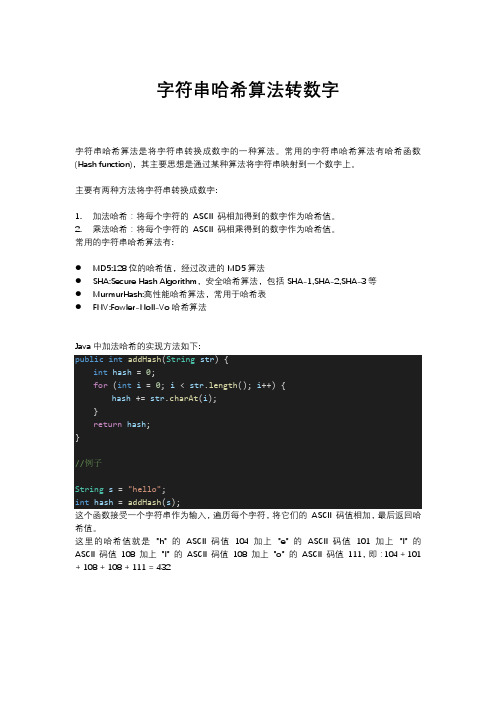
字符串哈希算法转数字字符串哈希算法是将字符串转换成数字的一种算法。
常用的字符串哈希算法有哈希函数(Hash function),其主要思想是通过某种算法将字符串映射到一个数字上。
主要有两种方法将字符串转换成数字:1.加法哈希:将每个字符的ASCII 码相加得到的数字作为哈希值。
2.乘法哈希:将每个字符的ASCII 码相乘得到的数字作为哈希值。
常用的字符串哈希算法有:●MD5:128位的哈希值,经过改进的MD5算法●SHA:Secure Hash Algorithm,安全哈希算法,包括SHA-1,SHA-2,SHA-3等●MurmurHash:高性能哈希算法,常用于哈希表●FNV:Fowler-Noll-Vo哈希算法Java中加法哈希的实现方法如下:public int addHash(String str) {int hash = 0;for (int i = 0; i < str.length(); i++) {hash += str.charAt(i);}return hash;}//例子String s = "hello";int hash = addHash(s);这个函数接受一个字符串作为输入,遍历每个字符,将它们的ASCII 码值相加,最后返回哈希值。
这里的哈希值就是"h" 的ASCII 码值104 加上"e" 的ASCII 码值101 加上"l" 的ASCII 码值108 加上"l" 的ASCII 码值108 加上"o" 的ASCII 码值111,即:104 + 101 + 108 + 108 + 111 = 432。
哈希表之bkdrhash算法解析及扩展
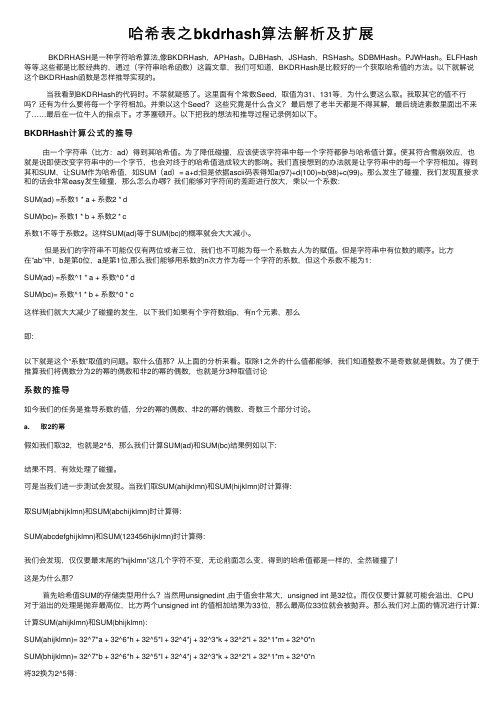
哈希表之bkdrhash算法解析及扩展BKDRHASH是⼀种字符哈希算法,像BKDRHash,APHash。
DJBHash,JSHash,RSHash。
SDBMHash。
PJWHash。
ELFHash 等等,这些都是⽐較经典的,通过(字符串哈希函数)这篇⽂章,我们可知道,BKDRHash是⽐較好的⼀个获取哈希值的⽅法。
以下就解说这个BKDRHash函数是怎样推导实现的。
当我看到BKDRHash的代码时。
不禁就疑惑了。
这⾥⾯有个常数Seed,取值为31、131等,为什么要这么取。
我取其它的值不⾏吗?还有为什么要将每⼀个字符相加。
并乘以这个Seed?这些究竟是什么含义?最后想了⽼半天都是不得其解,最后绕进素数⾥⾯出不来了……最后在⼀位⽜⼈的指点下。
才茅塞顿开。
以下把我的想法和推导过程记录例如以下。
BKDRHash计算公式的推导由⼀个字符串(⽐⽅:ad)得到其哈希值。
为了降低碰撞,应该使该字符串中每⼀个字符都參与哈希值计算。
使其符合雪崩效应,也就是说即使改变字符串中的⼀个字节,也会对终于的哈希值造成较⼤的影响。
我们直接想到的办法就是让字符串中的每⼀个字符相加。
得到其和SUM,让SUM作为哈希值,如SUM(ad)= a+d;但是依据ascii码表得知a(97)+d(100)=b(98)+c(99)。
那么发⽣了碰撞,我们发现直接求和的话会⾮常easy发⽣碰撞,那么怎么办哪?我们能够对字符间的差距进⾏放⼤,乘以⼀个系数:SUM(ad) =系数1 * a + 系数2 * dSUM(bc)= 系数1 * b + 系数2 * c系数1不等于系数2。
这样SUM(ad)等于SUM(bc)的概率就会⼤⼤减⼩。
但是我们的字符串不可能仅仅有两位或者三位,我们也不可能为每⼀个系数去⼈为的赋值。
但是字符串中有位数的顺序。
⽐⽅在”ab”中,b是第0位,a是第1位,那么我们能够⽤系数的n次⽅作为每⼀个字符的系数,但这个系数不能为1:SUM(ad) =系数^1 * a + 系数^0 * dSUM(bc)= 系数^1 * b + 系数^0 * c这样我们就⼤⼤减少了碰撞的发⽣,以下我们如果有个字符数组p,有n个元素,那么即:以下就是这个“系数”取值的问题。
哈希匹配算法

哈希匹配算法哈希匹配算法是一种常用的字符串匹配算法,它通过将字符串映射为一个固定长度的哈希值来进行匹配。
在实际应用中,哈希匹配算法被广泛用于字符串匹配、模式匹配、数据索引等领域。
一、哈希匹配算法的基本原理哈希匹配算法的基本原理是将字符串通过一个哈希函数转换为一个唯一的哈希值,然后将这个哈希值与其他字符串进行比较,从而实现字符串匹配的功能。
哈希函数的设计非常重要,它应该具备以下特点:1. 输入相同的字符串,哈希函数应该返回相同的哈希值;2. 输入不同的字符串,哈希函数应该返回不同的哈希值。
1. 字符串匹配:在文本处理、搜索引擎等领域,哈希匹配算法常被用于字符串匹配。
通过将待匹配的字符串和已有的字符串进行哈希映射,可以快速地找到匹配的结果。
2. 模式匹配:在字符串处理、编译原理等领域,哈希匹配算法被用于模式匹配。
通过将模式串和待匹配的字符串进行哈希映射,可以高效地找到模式串在待匹配字符串中的位置。
3. 数据索引:在数据库、搜索引擎等领域,哈希匹配算法被用于数据索引。
通过将数据的关键字进行哈希映射,可以快速地找到对应的数据项。
三、哈希匹配算法的优缺点1. 优点:(1)高效性:哈希匹配算法通过哈希映射的方式进行匹配,能够快速定位到待匹配字符串的位置,从而提高匹配效率。
(2)灵活性:哈希匹配算法可以根据实际需求设计不同的哈希函数,适应不同的应用场景。
(3)可扩展性:哈希匹配算法可以通过调整哈希函数的参数来适应不同规模的数据集。
2. 缺点:(1)冲突问题:由于哈希函数的映射是将一个无限的输入域映射到一个有限的输出域,所以在实际应用中,哈希函数可能会出现冲突,导致多个不同的字符串映射到同一个哈希值上。
(2)哈希函数设计困难:设计一个好的哈希函数是非常困难的,需要考虑多个因素,并且需要保证输入相同的字符串一定能够得到相同的哈希值,输入不同的字符串一定能够得到不同的哈希值。
四、哈希匹配算法的改进方法1. 拉链法:当哈希函数出现冲突时,可以使用拉链法来解决。
几种字符串哈希HASH算法的性能比较

几种字符串哈希HASH算法的性能比较2011年01月26日星期三 19:40这不就是要找hash table的hash function吗?1 概述链表查找的时间效率为O(N),二分法为log2N,B+ Tree为log2N,但Hash链表查找的时间效率为O(1)。
设计高效算法往往需要使用Hash链表,常数级的查找速度是任何别的算法无法比拟的,Hash 链表的构造和冲突的不同实现方法对效率当然有一定的影响,然而Hash函数是Hash链表最核心的部分,本文尝试分析一些经典软件中使用到的字符串 Hash函数在执行效率、离散性、空间利用率等方面的性能问题。
2 经典字符串Hash函数介绍作者阅读过大量经典软件原代码,下面分别介绍几个经典软件中出现的字符串Hash函数。
2.1 PHP中出现的字符串Hash函数static unsigned long hashpjw(char *arKey, unsigned int nKeyLength) {unsigned long h = 0, g;char *arEnd=arKey+nKeyLength;while (arKey < arEnd) {h = (h << 4) + *arKey++;if ((g = (h & 0xF0000000))) {h = h ^ (g >> 24);h = h ^ g;}}return h;}2.2 OpenSSL中出现的字符串Hash函数unsigned long lh_strhash(char *str){int i,l;unsigned long ret=0;unsigned short *s;if (str == NULL) return(0);l=(strlen(str)+1)/2;s=(unsigned short *)str;for (i=0; iret^=(s[i]<<(i&0x0f));return(ret);} *//* The following hash seems to work very well on normal text strings * no collisions on /usr/dict/words and it distributes on %2^n quite * well, not as good as MD5, but still good.*/unsigned long lh_strhash(const char *c){unsigned long ret=0;long n;unsigned long v;int r;if ((c == NULL) || (*c == '\0'))return(ret);/*unsigned char b[16];MD5(c,strlen(c),b);return(b[0]|(b[1]<<8)|(b[2]<<16)|(b[3]<<24));*/n=0x100;while (*c){v=n|(*c);n+=0x100;r= (int)((v>>2)^v)&0x0f;ret=(ret<>(32-r));ret&=0xFFFFFFFFL;ret^=v*v;c++;}return((ret>>16)^ret);}在下面的测量过程中我们分别将上面的两个函数标记为OpenSSL_Hash1和OpenSSL_Hash2,至于上面的实现中使用MD5算法的实现函数我们不作测试。
RabinKarp算法利用哈希函数解决字符串匹配问题
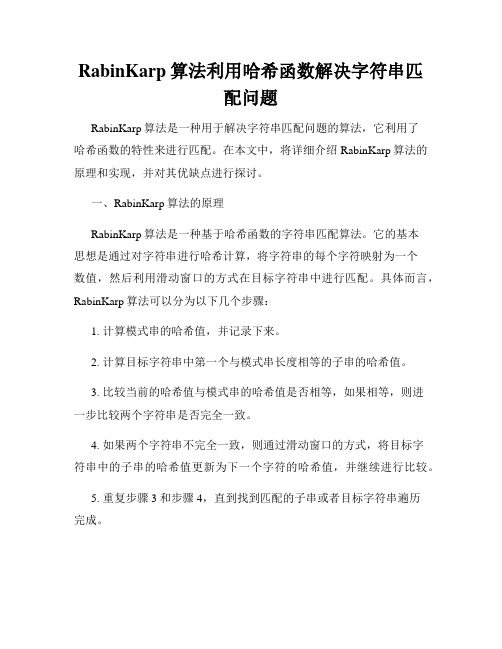
RabinKarp算法利用哈希函数解决字符串匹配问题RabinKarp算法是一种用于解决字符串匹配问题的算法,它利用了哈希函数的特性来进行匹配。
在本文中,将详细介绍RabinKarp算法的原理和实现,并对其优缺点进行探讨。
一、RabinKarp算法的原理RabinKarp算法是一种基于哈希函数的字符串匹配算法。
它的基本思想是通过对字符串进行哈希计算,将字符串的每个字符映射为一个数值,然后利用滑动窗口的方式在目标字符串中进行匹配。
具体而言,RabinKarp算法可以分为以下几个步骤:1. 计算模式串的哈希值,并记录下来。
2. 计算目标字符串中第一个与模式串长度相等的子串的哈希值。
3. 比较当前的哈希值与模式串的哈希值是否相等,如果相等,则进一步比较两个字符串是否完全一致。
4. 如果两个字符串不完全一致,则通过滑动窗口的方式,将目标字符串中的子串的哈希值更新为下一个字符的哈希值,并继续进行比较。
5. 重复步骤3和步骤4,直到找到匹配的子串或者目标字符串遍历完成。
通过利用哈希函数的计算,RabinKarp算法能够在平均情况下以线性时间复杂度O(n+m)完成匹配,其中n和m分别为目标字符串和模式串的长度。
二、RabinKarp算法的实现下面给出RabinKarp算法的具体实现代码:```pythondef rabin_karp(pattern, text):n = len(text)m = len(pattern)pattern_hash = hash(pattern)for i in range(n-m+1):window = text[i:i+m]window_hash = hash(window)if window_hash == pattern_hash and window == pattern:return ireturn -1```在上述代码中,我们可以看到,通过调用`hash()`函数计算字符串的哈希值,从而实现了RabinKarp算法的匹配过程。
哈希算法实现字符串匹配

哈希算法实现字符串匹配对于匹配字符串m和⽬标字符串n,最朴素的思想就是对于每个起始位置都o(m)地直接⽐较字符是否相同,最后时间复杂度为O(m*n)这样的时间复杂度在⼤多数时候都很不乐观,因此需要⼀些技巧降低时间复杂度。
哈希算法:我们可以将⼀段字符串映射为数值然后⽐较数值⼤⼩,若相等则匹配成功。
这是理想情况下的,要达到这样的效果需要哈希算法具备⼀定的抗碰撞性(即不同的字符串不会映射到同⼀数值)。
在这个前提下,要是计算每个长度为m的字符串的哈希值,最终复杂度必然还是O(m*n),这⾥可以⽤滚动哈希的⽅法优化。
对于匹配字符串 s=C₁C₂C₃.....C 哈希值H=C₁*B^(m-1)+C₂*B^(m-2)+C₃*B^(m-3)+...+C 其中B取⼀个⾮常⼤素数如(1e9+7),B^(m-1)表⽰B的m-1次⽅对于⽬标字符串ss=A₁A₂A₃....A 已知A₁开始长度为m的字符串的哈希值为h ,要得到A₂开始长度为m的字符串的哈希值只需h′ = h*B-A₁*B^m+D 其中D为第(m+1)位字符,就可以在O(n)的时间复杂度内实现字符串匹配先上代码:1 #include<iostream>2 #include<algorithm>3 #include<string>4 #include<set>5 #include<vector>6 #include<queue>7 #include<stack>8 #include<map>9 #include<cmath>10 #include<string>11using namespace std;12 typedef unsigned long long ull;13char s[1010][1010];14char pat[110][55][1010];15 ull hash_[1010][1010], temp[1010][1010];16const ull B = 1e9 + 7, A = 9973;17int N, M, P, Q, T;18void comput_hash(char a[][1010], int n, int m)19 {20int i, j, k;21 ull e = 0, t1 = 1, t2 = 1;22for (i = 1; i <= Q; i++)23 t1 *= A;24for (i = 1; i <= n; i++)25 {26 e = 0;27for (j = 1; j <= Q; j++)28 e = e * A + a[i][j];29for (j = 1; j + Q - 1 <= m; j++)30 {31 temp[i][j] = e;32if (j + Q <= m)33 e = e * A - a[i][j] * t1 + a[i][j + Q];34 }35 }3637 e = 0;38for (i = 1; i <= P; i++)39 t2 *= B;40for (j = 1; j + Q - 1 <= m; j++)41 {42 e = 0;43for (i = 1; i <= P; i++)44 e = e * B + temp[i][j];45for (i = 1; i + P - 1 <= n; i++)46 {47 hash_[i][j] = e;48if (i + P <= n)49 e = e * B - temp[i][j] * t2 + temp[i + P][j];50 }51 }52 }53int main()54 {55int i, j, k;56int cnt = 0, ans;57while (~scanf("%d%d%d%d%d", &N, &M, &T, &P, &Q))58 {59if (N == 0 && M == 0 && P == 0 && Q == 0 && T == 0)60break;61for (i = 1; i <= N; i++)62 scanf("%s", s[i] + 1);63for (k = 1; k <= T; k++)64for (i = 1; i <= P; i++)65 scanf("%s", pat[k][i] + 1);6667 multiset<ull>ml;68for (i = 1; i <= T; i++)69 {70 comput_hash(pat[i], P, Q);71 ml.insert(hash_[1][1]);72 }7374 comput_hash(s, N, M);75for (i = 1; i + P - 1 <= N; i++)76for (j = 1; j + Q - 1 <= M; j++)77 ml.erase(hash_[i][j]);7879 ans = T - ml.size();80 printf("Case %d: %d\n", ++cnt, ans);81 }82return0;83 }对于这道题,我们可以先只看⼀个维度,对于⼀个维度的匹配就是简单的板⼦题,就像之前所说进⾏匹配即可,在拓展到⼆维时,应该考虑⾏列均相同。
哈希算法的原理及应用实验
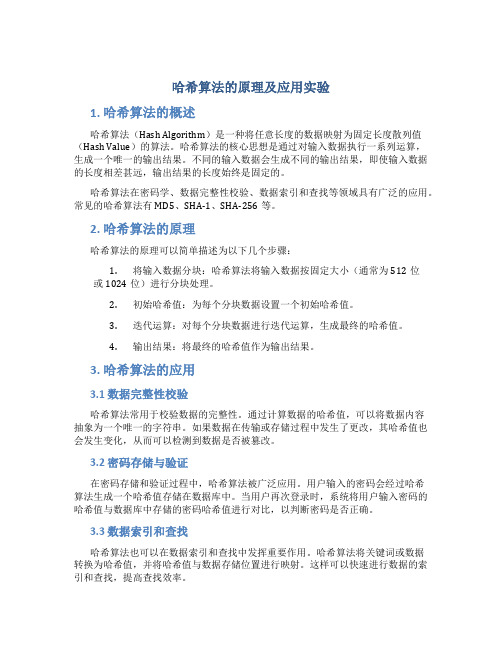
哈希算法的原理及应用实验1. 哈希算法的概述哈希算法(Hash Algorithm)是一种将任意长度的数据映射为固定长度散列值(Hash Value)的算法。
哈希算法的核心思想是通过对输入数据执行一系列运算,生成一个唯一的输出结果。
不同的输入数据会生成不同的输出结果,即使输入数据的长度相差甚远,输出结果的长度始终是固定的。
哈希算法在密码学、数据完整性校验、数据索引和查找等领域具有广泛的应用。
常见的哈希算法有MD5、SHA-1、SHA-256等。
2. 哈希算法的原理哈希算法的原理可以简单描述为以下几个步骤:1.将输入数据分块:哈希算法将输入数据按固定大小(通常为512位或1024位)进行分块处理。
2.初始哈希值:为每个分块数据设置一个初始哈希值。
3.迭代运算:对每个分块数据进行迭代运算,生成最终的哈希值。
4.输出结果:将最终的哈希值作为输出结果。
3. 哈希算法的应用3.1 数据完整性校验哈希算法常用于校验数据的完整性。
通过计算数据的哈希值,可以将数据内容抽象为一个唯一的字符串。
如果数据在传输或存储过程中发生了更改,其哈希值也会发生变化,从而可以检测到数据是否被篡改。
3.2 密码存储与验证在密码存储和验证过程中,哈希算法被广泛应用。
用户输入的密码会经过哈希算法生成一个哈希值存储在数据库中。
当用户再次登录时,系统将用户输入密码的哈希值与数据库中存储的密码哈希值进行对比,以判断密码是否正确。
3.3 数据索引和查找哈希算法也可以在数据索引和查找中发挥重要作用。
哈希算法将关键词或数据转换为哈希值,并将哈希值与数据存储位置进行映射。
这样可以快速进行数据的索引和查找,提高查找效率。
4. 哈希算法的实验为了更好地理解哈希算法的原理,我们可以进行一个简单的实验,使用Python 来实现。
4.1 实验准备首先,安装Python编程语言并确保在本地环境中可正常运行。
4.2 实验步骤1.创建一个新的Python文件,命名为hash_experiment.py。
lua 字符串 hash值计算
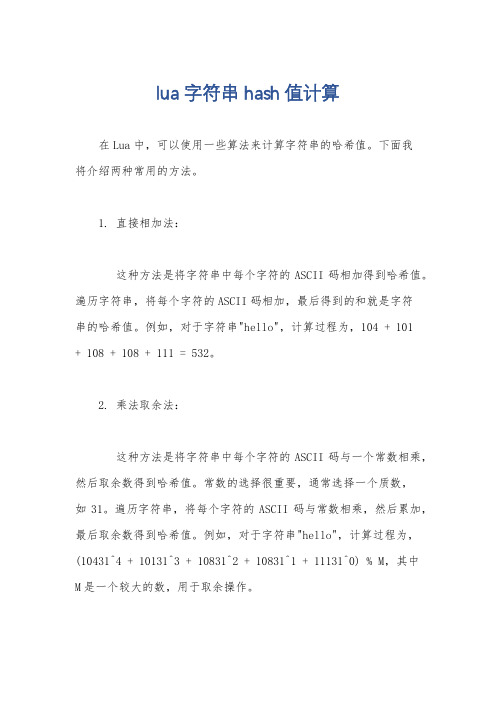
lua 字符串 hash值计算
在Lua中,可以使用一些算法来计算字符串的哈希值。
下面我
将介绍两种常用的方法。
1. 直接相加法:
这种方法是将字符串中每个字符的ASCII码相加得到哈希值。
遍历字符串,将每个字符的ASCII码相加,最后得到的和就是字符
串的哈希值。
例如,对于字符串"hello",计算过程为,104 + 101
+ 108 + 108 + 111 = 532。
2. 乘法取余法:
这种方法是将字符串中每个字符的ASCII码与一个常数相乘,然后取余数得到哈希值。
常数的选择很重要,通常选择一个质数,
如31。
遍历字符串,将每个字符的ASCII码与常数相乘,然后累加,最后取余数得到哈希值。
例如,对于字符串"hello",计算过程为,(10431^4 + 10131^3 + 10831^2 + 10831^1 + 11131^0) % M,其中
M是一个较大的数,用于取余操作。
需要注意的是,这两种方法都有可能出现哈希冲突,即不同的字符串计算得到相同的哈希值。
为了减少冲突的可能性,可以选择一个合适的常数或者使用更复杂的哈希算法。
除了上述方法外,还可以使用Lua的内置函数`string.byte()`来获取字符串中每个字符的ASCII码,然后进行某种计算得到哈希值。
具体的计算方式可以根据实际需求来确定。
需要注意的是,哈希值是一种快速计算和比较字符串的方法,但不适合用于加密或者安全相关的场景。
在这些场景下,应该使用专门的加密算法来保护数据的安全性。
哈希算法简单举例

哈希算法简单举例哈希算法是一种常用的密码学算法,它可以将任意长度的数据输入转化为固定长度的哈希值,通常用于安全存储密码、认证用户和数据完整性验证等场景。
下面将通过举例来简单介绍哈希算法的原理和应用。
常见的哈希算法包括MD5、SHA-1、SHA-256等。
以MD5算法为例来说明,该算法生成的哈希值为128位二进制数,通常以32位的十六进制字符串来表示。
假设有一个字符串"Hello World!",我们对它进行MD5哈希运算,得到的结果是5eb63bbbe01eeed093cb22bb8f5acdc3、可以通过以下步骤进行计算:1.初始化MD5算法,选择初始向量IV和常量表,将初始向量赋值给A、B、C、D四个变量。
3.对二进制数进行填充,使得总位数为512的倍数。
4.将填充后的二进制数分割为多个512位的数据块。
5.对每个数据块进行处理,首先将初始向量的值赋给A、B、C、D四个变量,然后进行四轮运算:循环处理数据块中的每个32位分组。
每轮采用不同的非线性函数F、G、H、I,以及位操作和循环位移运算,对每个分组进行混合运算以得到新的A、B、C、D值。
最终,将四个变量的值进行拼接,得到本次数据块的哈希结果。
6.将多个数据块的哈希结果进行拼接,形成最终的哈希值。
哈希算法的应用非常广泛,以下是几个常见场景:1.安全存储密码:通常在用户注册时,将用户输入的密码进行哈希计算,并将哈希值存储在数据库中。
当用户登录时,对输入的密码进行哈希计算,并与数据库中存储的哈希值进行比对。
由于哈希函数的单向性,即很难从哈希值反推出原始密码,可以有效保障密码的安全性。
3.文件去重:通过计算文件的哈希值,可以将已存在的文件去重。
当多个文件的哈希值相同时,可以认为文件内容相同,只需要保留一个副本。
4.版权保护:通过哈希算法可以计算出文件的唯一标识,用于版权保护和数字签名等场景。
例如,在数字版权管理中,可以通过哈希算法对文件进行签名,验证文件的完整性和真实性。
字符串的哈希码
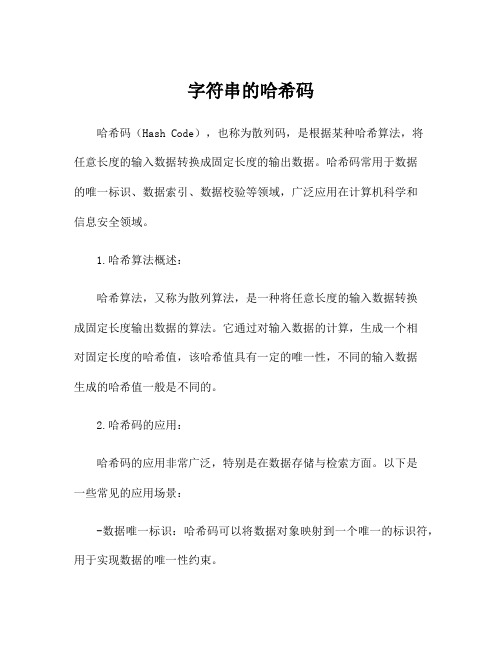
字符串的哈希码哈希码(Hash Code),也称为散列码,是根据某种哈希算法,将任意长度的输入数据转换成固定长度的输出数据。
哈希码常用于数据的唯一标识、数据索引、数据校验等领域,广泛应用在计算机科学和信息安全领域。
1.哈希算法概述:哈希算法,又称为散列算法,是一种将任意长度的输入数据转换成固定长度输出数据的算法。
它通过对输入数据的计算,生成一个相对固定长度的哈希值,该哈希值具有一定的唯一性,不同的输入数据生成的哈希值一般是不同的。
2.哈希码的应用:哈希码的应用非常广泛,特别是在数据存储与检索方面。
以下是一些常见的应用场景:-数据唯一标识:哈希码可以将数据对象映射到一个唯一的标识符,用于实现数据的唯一性约束。
-数据索引:哈希码可以用作数据的索引,加快数据的存储和检索速度。
-数据校验:哈希码可以用于校验数据的完整性,通过比对哈希值来检测数据是否被篡改。
-密码存储:在用户注册和登录等场景中,常用哈希算法对用户密码进行加密存储,保护用户的隐私。
-分布式系统:在分布式系统中,哈希值可以用于数据的负载均衡,将数据均匀地分布在不同的节点上。
3.哈希算法的特点:-哈希碰撞:由于哈希算法将无限长度的输入映射到有限长度的输出,必然会发生多个输入数据映射到同一哈希值的情况,即哈希碰撞。
好的哈希算法应该尽量减少碰撞的概率。
-哈希值唯一性:好的哈希算法应该尽量保证不同的输入数据生成的哈希值是不重复的,以提高哈希码的唯一性,减少误判率。
-哈希冲突:哈希冲突发生在不同的输入数据映射到同一哈希值的情况下。
好的哈希算法应该尽量减少哈希冲突的概率,提高哈希算法的效率。
-哈希算法的复杂度:好的哈希算法应该具有较低的计算复杂度,以提高哈希值的生成速度,适用于高效的数据处理和存储。
4.常见的哈希算法:目前,常见的哈希算法有很多种,每种算法都有自己的特点和适用场景。
以下是一些常见的哈希算法:- MD5:MD5(Message Digest Algorithm 5)是一种非常常用的哈希算法,生成的哈希码为128位,具有较好的唯一性和碰撞概率,但已被证明存在安全性问题,不适用于密码存储等敏感场景。
c语言调用哈希算法
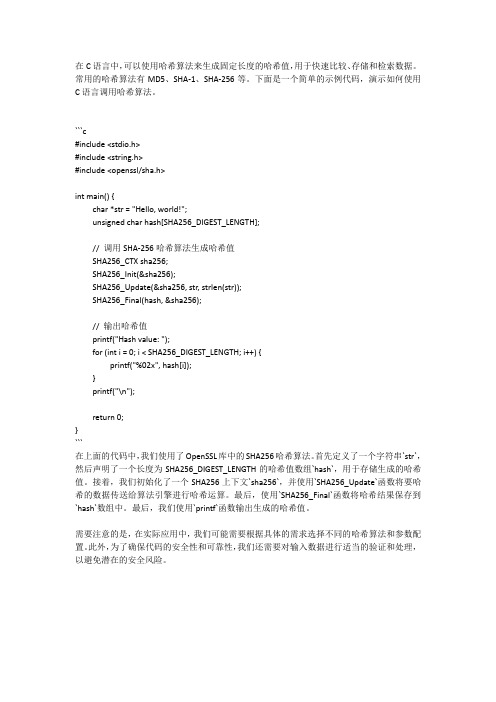
在C语言中,可以使用哈希算法来生成固定长度的哈希值,用于快速比较、存储和检索数据。
常用的哈希算法有MD5、SHA-1、SHA-256等。
下面是一个简单的示例代码,演示如何使用C语言调用哈希算法。
```c#include <stdio.h>#include <string.h>#include <openssl/sha.h>int main() {char *str = "Hello, world!";unsigned char hash[SHA256_DIGEST_LENGTH];// 调用SHA-256哈希算法生成哈希值SHA256_CTX sha256;SHA256_Init(&sha256);SHA256_Update(&sha256, str, strlen(str));SHA256_Final(hash, &sha256);// 输出哈希值printf("Hash value: ");for (int i = 0; i < SHA256_DIGEST_LENGTH; i++) {printf("%02x", hash[i]);}printf("\n");return 0;}```在上面的代码中,我们使用了OpenSSL库中的SHA256哈希算法。
首先定义了一个字符串`str`,然后声明了一个长度为SHA256_DIGEST_LENGTH的哈希值数组`hash`,用于存储生成的哈希值。
接着,我们初始化了一个SHA256上下文`sha256`,并使用`SHA256_Update`函数将要哈希的数据传送给算法引擎进行哈希运算。
最后,使用`SHA256_Final`函数将哈希结果保存到`hash`数组中。
最后,我们使用`printf`函数输出生成的哈希值。
golang哈希算法

golang哈希算法全文共四篇示例,供读者参考第一篇示例:哈希算法在编程中起到了非常重要的作用,它能够将数据转化成一段固定长度的字符串,常用于密码加密、数据校验等领域。
Golang (又称Go语言)是一门由Google开发的开源编程语言,具有简洁、高效、强大的特点,因此在Golang中的哈希算法也备受关注。
本文将围绕Golang中常用的哈希算法进行讲解,希望能给读者带来一些启发和帮助。
在Golang中,哈希算法主要通过标准库中的crypto包来实现。
其中最常用的哈希算法包括MD5、SHA-1、SHA-256等。
这些哈希算法都具有固定的输出长度,分别是128位、160位、256位等。
下面我们来逐一介绍这几种哈希算法的使用方法及注意事项。
首先是MD5哈希算法。
MD5算法是一种广泛使用的哈希算法,其输出长度为128位。
在Golang中,可以通过crypto/md5包来实现MD5哈希算法的计算。
下面是一个示例代码:import ("crypto/md5""fmt")上面的代码演示了如何使用MD5算法计算字符串"hello world"的哈希值。
需要注意的是,在实际应用中,MD5算法由于容易出现碰撞(即不同的数据可能产生相同的哈希值),因此不推荐用于安全领域。
除了以上提到的几种哈希算法外,Golang还提供了其他一些哈希算法的实现,比如SHA-512、Blake2等。
读者可以根据具体需求选择合适的哈希算法。
在使用哈希算法时,需要注意保护好哈希值,避免泄露和篡改,以确保数据的安全性。
Golang中的哈希算法是编程中常用的一种技第二篇示例:Golang哈希算法是一种用于在Go编程语言中生成哈希值的算法。
哈希算法在计算机科学中广泛应用,可以用于数据加密、数据完整性验证、密码学等领域。
在Go语言中,哈希算法是支持并且内置的,开发人员可以方便地使用这些算法来处理数据,保护数据的安全性。
字符串哈希函数
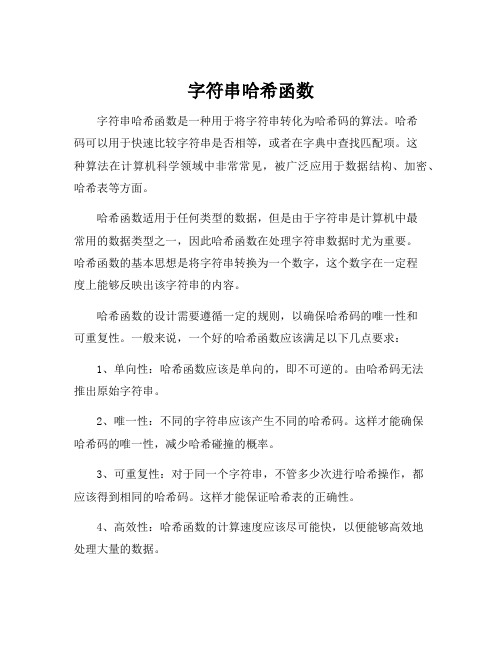
字符串哈希函数字符串哈希函数是一种用于将字符串转化为哈希码的算法。
哈希码可以用于快速比较字符串是否相等,或者在字典中查找匹配项。
这种算法在计算机科学领域中非常常见,被广泛应用于数据结构、加密、哈希表等方面。
哈希函数适用于任何类型的数据,但是由于字符串是计算机中最常用的数据类型之一,因此哈希函数在处理字符串数据时尤为重要。
哈希函数的基本思想是将字符串转换为一个数字,这个数字在一定程度上能够反映出该字符串的内容。
哈希函数的设计需要遵循一定的规则,以确保哈希码的唯一性和可重复性。
一般来说,一个好的哈希函数应该满足以下几点要求:1、单向性:哈希函数应该是单向的,即不可逆的。
由哈希码无法推出原始字符串。
2、唯一性:不同的字符串应该产生不同的哈希码。
这样才能确保哈希码的唯一性,减少哈希碰撞的概率。
3、可重复性:对于同一个字符串,不管多少次进行哈希操作,都应该得到相同的哈希码。
这样才能保证哈希表的正确性。
4、高效性:哈希函数的计算速度应该尽可能快,以便能够高效地处理大量的数据。
在实际应用中,不同的哈希函数可能会根据需求进行不同的优化。
例如,在哈希表中,需要尽可能地减少哈希碰撞的概率,以提高查询的效率。
而在加密算法中,哈希函数的主要目的是保证数据的安全性,因此需要更高的哈希唯一性,以避免被破解。
总的来说,哈希函数在计算机科学领域中具有非常重要的作用,它能够在处理大量数据时提高计算效率,并且可以应用于多种场景中,包括数据结构、算法、加密等等。
因此,在实际开发中,选择合适的哈希函数非常关键,设计出高效、安全、唯一的哈希函数,将大大提升软件的性能和安全性。
python 字符串的哈希值
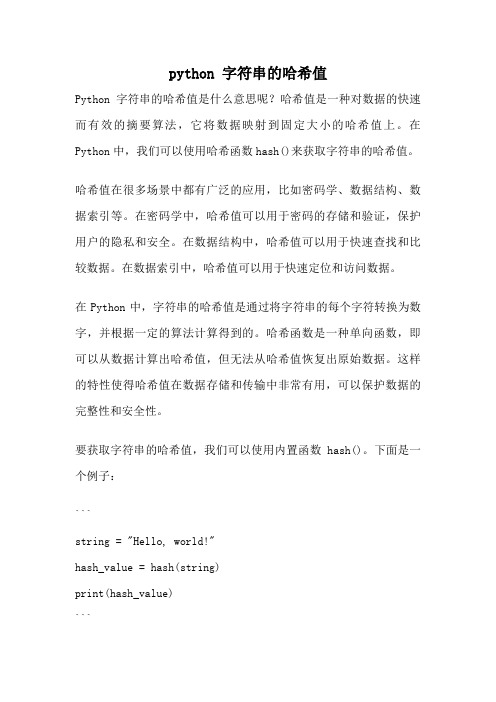
python 字符串的哈希值Python字符串的哈希值是什么意思呢?哈希值是一种对数据的快速而有效的摘要算法,它将数据映射到固定大小的哈希值上。
在Python中,我们可以使用哈希函数hash()来获取字符串的哈希值。
哈希值在很多场景中都有广泛的应用,比如密码学、数据结构、数据索引等。
在密码学中,哈希值可以用于密码的存储和验证,保护用户的隐私和安全。
在数据结构中,哈希值可以用于快速查找和比较数据。
在数据索引中,哈希值可以用于快速定位和访问数据。
在Python中,字符串的哈希值是通过将字符串的每个字符转换为数字,并根据一定的算法计算得到的。
哈希函数是一种单向函数,即可以从数据计算出哈希值,但无法从哈希值恢复出原始数据。
这样的特性使得哈希值在数据存储和传输中非常有用,可以保护数据的完整性和安全性。
要获取字符串的哈希值,我们可以使用内置函数hash()。
下面是一个例子:```string = "Hello, world!"hash_value = hash(string)print(hash_value)```运行以上代码,输出结果为:```-8762436431444442715```可以看到,字符串"Hello, world!"的哈希值是一个很大的负数。
哈希值的范围是由计算机的位数决定的,在32位系统中通常是32位的整数,在64位系统中通常是64位的整数。
需要注意的是,不同的字符串可能会有相同的哈希值,这种情况称为哈希冲突。
哈希函数通常会通过一些技巧来减少哈希冲突的概率,比如使用更复杂的算法和增加哈希值的位数。
然而,无法完全避免哈希冲突,因此在使用哈希值进行比较和查找时,需要进行额外的处理。
除了字符串,Python中的其他数据类型也可以计算哈希值,比如整数、浮点数、元组等。
哈希值的计算方式和字符串类似,都是将数据转换为数字,并根据一定的算法计算得到的。
总结一下,Python字符串的哈希值是通过将字符串的每个字符转换为数字,并根据一定的算法计算得到的。
哈希 字符串 基数转换法
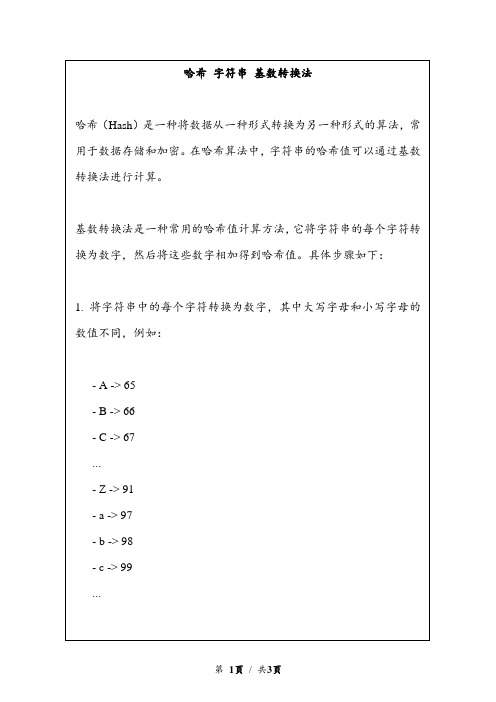
哈希字符串基数转换法哈希(Hash)是一种将数据从一种形式转换为另一种形式的算法,常用于数据存储和加密。
在哈希算法中,字符串的哈希值可以通过基数转换法进行计算。
基数转换法是一种常用的哈希值计算方法,它将字符串的每个字符转换为数字,然后将这些数字相加得到哈希值。
具体步骤如下:1. 将字符串中的每个字符转换为数字,其中大写字母和小写字母的数值不同,例如:- A -> 65- B -> 66- C -> 67...- Z -> 91- a -> 97- b -> 98- c -> 99...2. 将转换后的数字相加,得到哈希值。
例如,假设要计算字符串"Hello, World!" 的哈希值,可以按照以下步骤进行计算:1. 将字符串中的每个字符转换为数字:- H -> 72 (65 + 7 = 72)- e -> 101 (10 + 61 = 71)- l -> 120 (12 + 108 = 120)- o -> 162 (12 + 50 + 6 = 162)- , -> 44 (12 + 32 = 44)- r -> 121 (12 + 109 = 121)- l -> 120 (12 + 108 = 120)- D -> 70 (65 + 5 = 70)- l -> 120 (12 + 108 = 120)- l -> 120 (12 + 108 = 120)- o -> 162 (12 + 50 + 6 = 162)- ! -> 101 (10 + 61 = 71)2. 将转换后的数字相加得到哈希值:72 + 101 + 120 + 162 + 44 + 121 + 120 + 70 + 120 + 120 + 162 + 101 = 999因此,字符串"Hello, World!" 的哈希值为999。
判断字符串加密的方法
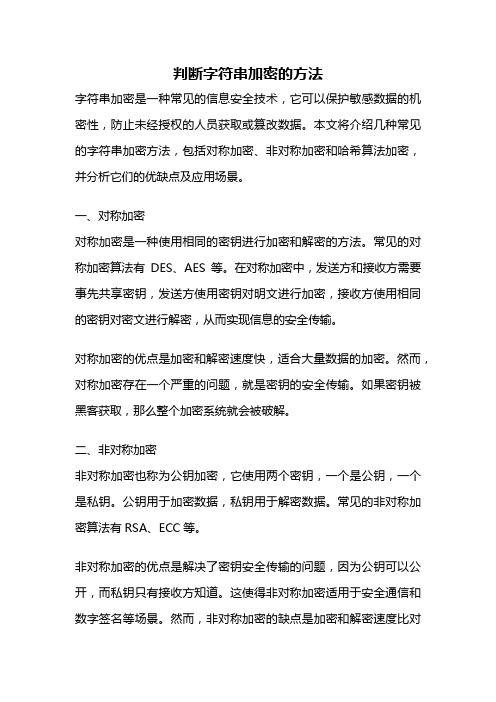
判断字符串加密的方法字符串加密是一种常见的信息安全技术,它可以保护敏感数据的机密性,防止未经授权的人员获取或篡改数据。
本文将介绍几种常见的字符串加密方法,包括对称加密、非对称加密和哈希算法加密,并分析它们的优缺点及应用场景。
一、对称加密对称加密是一种使用相同的密钥进行加密和解密的方法。
常见的对称加密算法有DES、AES等。
在对称加密中,发送方和接收方需要事先共享密钥,发送方使用密钥对明文进行加密,接收方使用相同的密钥对密文进行解密,从而实现信息的安全传输。
对称加密的优点是加密和解密速度快,适合大量数据的加密。
然而,对称加密存在一个严重的问题,就是密钥的安全传输。
如果密钥被黑客获取,那么整个加密系统就会被破解。
二、非对称加密非对称加密也称为公钥加密,它使用两个密钥,一个是公钥,一个是私钥。
公钥用于加密数据,私钥用于解密数据。
常见的非对称加密算法有RSA、ECC等。
非对称加密的优点是解决了密钥安全传输的问题,因为公钥可以公开,而私钥只有接收方知道。
这使得非对称加密适用于安全通信和数字签名等场景。
然而,非对称加密的缺点是加密和解密速度比对称加密慢,适合小量数据的加密。
三、哈希算法加密哈希算法是一种将任意长度的数据映射为固定长度哈希值的算法。
常见的哈希算法有MD5、SHA-1、SHA-256等。
哈希算法是单向的,即无法通过哈希值反推原始数据。
哈希算法加密的优点是加密速度快,哈希值固定长度,适合存储密码等场景。
然而,哈希算法存在哈希碰撞的问题,即不同的明文可能会生成相同的哈希值,这会导致安全性问题。
对称加密、非对称加密和哈希算法加密各有优缺点,适用于不同的应用场景。
在实际应用中,我们可以根据需要选择合适的加密方法。
对于传输大量数据的场景,可以使用对称加密;对于保证密钥安全传输的场景,可以使用非对称加密;而对于存储密码等场景,可以使用哈希算法加密。
除了这些常见的加密方法外,还有其他一些高级的加密技术,如混淆加密、量子加密等。
bkdrhash原理
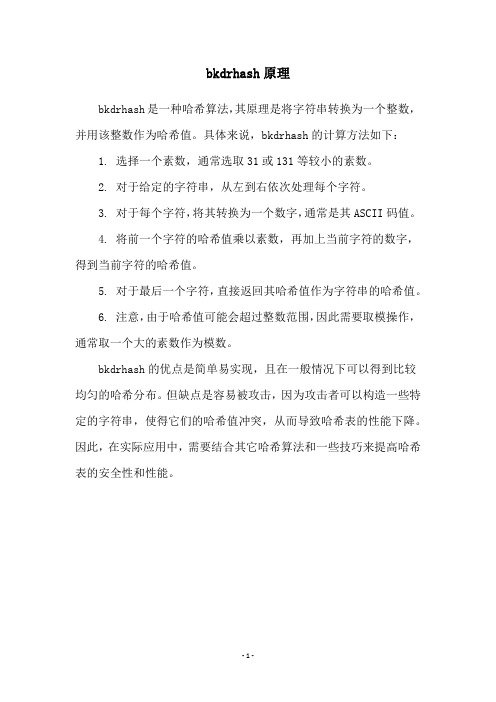
bkdrhash原理
bkdrhash是一种哈希算法,其原理是将字符串转换为一个整数,并用该整数作为哈希值。
具体来说,bkdrhash的计算方法如下:
1. 选择一个素数,通常选取31或131等较小的素数。
2. 对于给定的字符串,从左到右依次处理每个字符。
3. 对于每个字符,将其转换为一个数字,通常是其ASCII码值。
4. 将前一个字符的哈希值乘以素数,再加上当前字符的数字,得到当前字符的哈希值。
5. 对于最后一个字符,直接返回其哈希值作为字符串的哈希值。
6. 注意,由于哈希值可能会超过整数范围,因此需要取模操作,通常取一个大的素数作为模数。
bkdrhash的优点是简单易实现,且在一般情况下可以得到比较均匀的哈希分布。
但缺点是容易被攻击,因为攻击者可以构造一些特定的字符串,使得它们的哈希值冲突,从而导致哈希表的性能下降。
因此,在实际应用中,需要结合其它哈希算法和一些技巧来提高哈希表的安全性和性能。
- 1 -。
- 1、下载文档前请自行甄别文档内容的完整性,平台不提供额外的编辑、内容补充、找答案等附加服务。
- 2、"仅部分预览"的文档,不可在线预览部分如存在完整性等问题,可反馈申请退款(可完整预览的文档不适用该条件!)。
- 3、如文档侵犯您的权益,请联系客服反馈,我们会尽快为您处理(人工客服工作时间:9:00-18:30)。
经典字符串Hash函数工作中经常需要用大hash这个强有力的工具,hash表最核心的部分则在于怎么设计一个好的hash函数,以使数据更均匀地分布在若干个桶上。
下面来介绍一下我现在用到的一个hash函数,我们来看代码:unsigned chostcachehash::get_host_key(const string& host){int result = 1;unsigned i = 0;for (i = 0; i <host.size(); i++)result = 31 * result + host[i];return abs(result);}inline unsigned getkey(unsigned key){return (key % m_capacity);}m_capacity为hash桶的个数对于一个字符串,我们首先调用get_host_key()来得到一个key,然后再用这个key调用getkey来得到他在hash桶里的位置。
这个是我们在工作一直使用的hash函数,效果也还可以。
今天忽然心血来潮,在网上搜了一下看还有没有更好的hash函数,被我发现了这篇文章,于是转过来看看。
php中出现的字符串hash函数static unsigned long hashpjw(char *arkey,unsigned intnkeylength){unsigned long h = 0,g;char *arend=arkey+nkeylength;while (arkey<arend) {h = (h << 4) + *arkey++;if ((g = (h & 0xf0000000))) {h = h ^ (g >> 24);h = h ^ g;}}return h;}openssl中出现的字符串hash函数unsigned long lh_strhash(char *str){int i,l;unsigned long ret=0;unsigned short *s;if (str == null) return(0);l=(strlen(str)+1)/2;s=(unsigned short *)str;for (i=0; i %有点看不懂ret^=(s[i]<<(i&0x0f));return(ret);} *//* the following hash seems to work very well on normal text strings * no collisions on /usr/dict/words and it distributes on %2^n quite* well,not as good as md5,but still good.*/unsigned long lh_strhash(const char *c){unsigned long ret=0;long n;unsigned long v;int r;if ((c == null) || (*c == "{post.abstract}"))return(ret);/*unsigned char b[16];md5(c,strlen(c),b);return(b[0]|(b[1]<<8)|(b[2]<<16)|(b[3]<<24));*/n=0x100;while (*c){v=n|(*c);n+=0x100;r= (int)((v>>2)^v)&0x0f;ret=(ret<>(32-r));ret&=0xffffffffl;ret^=v*v;c++;}return((ret>>16)^ret);}mysql中出现的字符串hash函数#ifndefnew_hash_function/* calchashvalue for a key */static uintcalc_hashnr(const byte *key,uint length){register uint nr=1,nr2=4;while (length--){nr^= (((nr & 63)+nr2)*((uint) (uchar) *key++))+ (nr << 8);nr2+=3;}return((uint) nr);}/* calchashvalue for a key,case indepenently */static uintcalc_hashnr_caseup(const byte *key,uint length){register uint nr=1,nr2=4;while (length--){nr^= (((nr & 63)+nr2)*((uint) (uchar) toupper(*key++)))+ (nr << 8);nr2+=3;}return((uint) nr);}#else/** fowler/noll/vo hash** the basis of the hash algorithm was taken from an idea sent by email to the * ieeeposix p1003.2 mailing list from phongvo (kpv@) and * glenn fowler (gsf@). landon curt noll (chongo@) * later improved on their algorithm.** the magic is in the interesting relationship between the special prime* 16777619 (2^24 + 403) and 2^32 and 2^8.** this hash produces the fewest collisions of any function that we"ve seen so * far,and works well on both numbers and strings.*/uintcalc_hashnr(const byte *key,uintlen){const byte *end=key+len;uint hash;for (hash = 0; key < end; key++){hash *= 16777619;hash ^= (uint) *(uchar*) key;}return (hash);}uintcalc_hashnr_caseup(const byte *key,uintlen) {const byte *end=key+len;uint hash;for (hash = 0; key < end; key++){hash *= 16777619;hash ^= (uint) (uchar) toupper(*key);}return (hash);}#endif从上表可以看出,这些经典软件虽然构造字符串Hash函数的方法不同,但是它们的效率都是不错的,相互之间差距很小,读者可以参考实际情况从其中借鉴使用。
暴雪公司有个经典的字符串的hash公式先提一个简单的问题,假如有一个庞大的字符串数组,然后给你一个单独的字符串,让你从这个数组中查找是否有这个字符串并找到它,你会怎么做?有一个方法最简单,老老实实从头查到尾,一个一个比较,直到找到为止,我想只要学过程序设计的人都能把这样一个程序作出来,但要是有程序员把这样的程序交给用户,我只能用无语来评价,或许它真的能工作,但...也只能如此了。
最合适的算法自然是使用HashTable(哈希表),先介绍介绍其中的基本知识,所谓Hash,一般是一个整数,通过某种算法,可以把一个字符串"压缩" 成一个整数,这个数称为Hash,当然,无论如何,一个32位整数是无法对应回一个字符串的,但在程序中,两个字符串计算出的Hash值相等的可能非常小,下面看看在MPQ中的Hash算法unsigned long HashString(char *lpszFileName, unsigned long dwHashType){unsigned char *key = (unsigned char *)lpszFileName;unsigned long seed1 = 0x7FED7FED, seed2 = 0xEEEEEEEE;intch;while(*key != 0){ch = toupper(*key );seed1 = cryptTable[(dwHashType<< 8) ch] ^ (seed1 seed2);seed2 = ch seed1 seed2 (seed2 << 5) 3;}return seed1;}Blizzard的这个算法是非常高效的,被称为"One-Way Hash",举个例子,字符串"unitneutralacritter.grp"通过这个算法得到的结果是0xA26067F3。
是不是把第一个算法改进一下,改成逐个比较字符串的Hash值就可以了呢,答案是,远远不够,要想得到最快的算法,就不能进行逐个的比较,通常是构造一个哈希表(Hash Table)来解决问题,哈希表是一个大数组,这个数组的容量根据程序的要求来定义,例如1024,每一个Hash值通过取模运算(mod)对应到数组中的一个位置,这样,只要比较这个字符串的哈希值对应的位置又没有被占用,就可以得到最后的结果了,想想这是什么速度?是的,是最快的O(1),现在仔细看看这个算法吧intGetHashTablePos(char *lpszString, SOMESTRUCTURE *lpTable, intnTableSize){intnHash = HashString(lpszString), nHashPos = nHash % nTableSize;if (lpTable[nHashPos].bExists&& !strcmp(lpTable[nHashPos].pString, lpszString)) returnnHashPos;elsereturn -1; //Error value}看到此,我想大家都在想一个很严重的问题:"假如两个字符串在哈希表中对应的位置相同怎么办?",究竟一个数组容量是有限的,这种可能性很大。
